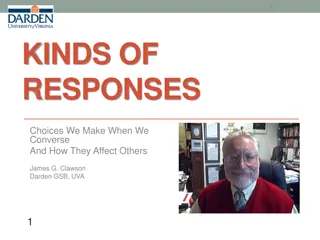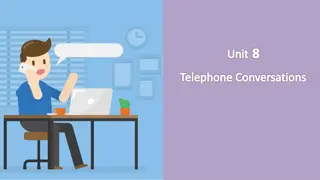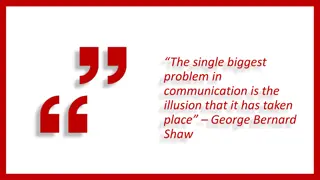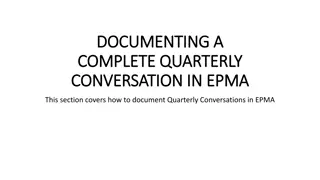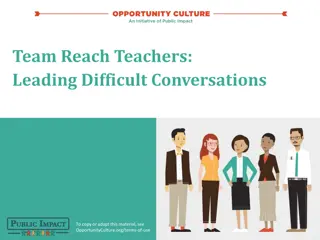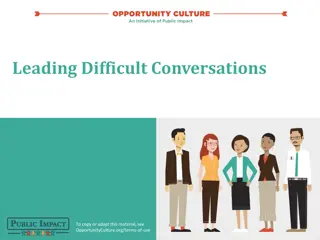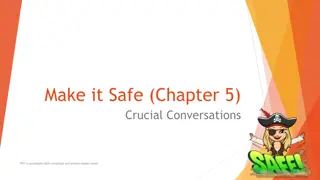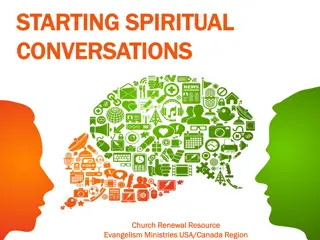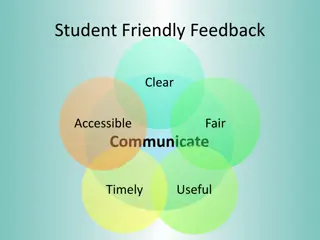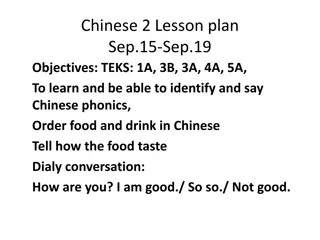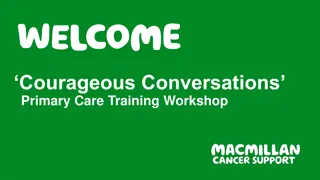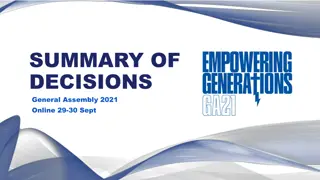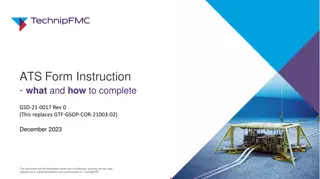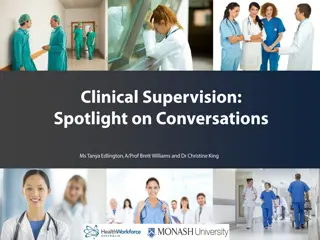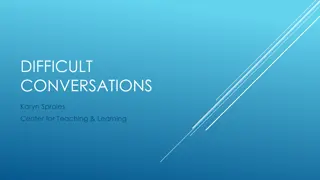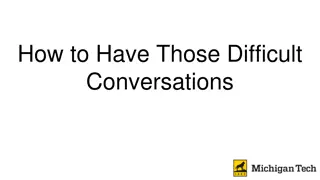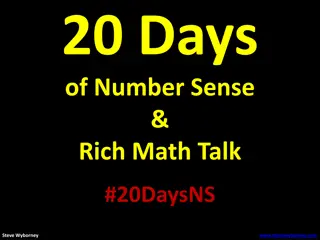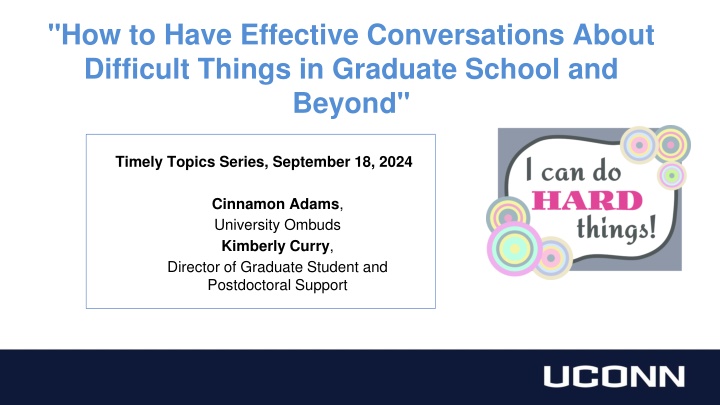
Effective Conversations About Difficult Topics in Graduate School
Explore strategies for navigating challenging conversations in graduate school and beyond. Learn how to prepare, engage, and follow up to reduce stress and enhance outcomes. Discover tools to address high stakes, strong emotions, and opposing opinions effectively.
Download Presentation

Please find below an Image/Link to download the presentation.
The content on the website is provided AS IS for your information and personal use only. It may not be sold, licensed, or shared on other websites without obtaining consent from the author. If you encounter any issues during the download, it is possible that the publisher has removed the file from their server.
You are allowed to download the files provided on this website for personal or commercial use, subject to the condition that they are used lawfully. All files are the property of their respective owners.
The content on the website is provided AS IS for your information and personal use only. It may not be sold, licensed, or shared on other websites without obtaining consent from the author.
E N D
Presentation Transcript
"How to Have Effective Conversations About Difficult Things in Graduate School and Beyond" Timely Topics Series, September 18, 2024 Cinnamon Adams, University Ombuds Kimberly Curry, Director of Graduate Student and Postdoctoral Support
Goals for today Leave with 1-2 things. Go with courage. Remember our humanity.
Flow of our time together Why is this topic important? Why is it hard? Preparing for conversation. Tools for engagement. Practice (mixed in throughout).
Stakes are High Strong Emotions Opposing Opinions Fear Making Matters Worse What makes a difficult conversation difficult? 3/18/2025
Reasons for stress and anxiety Not knowing how the other person will respond 43% WHAT ARE THE FIVE MAIN CAUSES OF FEAR? Not being able to get a point across clearly 31% Being in a confrontational situation 29% Getting upset or emotional 29% The other person getting upset or emotional 21% (Scott 2015) CMI Study
What tools have you found useful in navigating these types of conversations? 3/18/2025
Identify strategies to help reduce stress & Identify strategies to help reduce stress & increase successful outcomes increase successful outcomes Framework to consider: Framework to consider: oBefore the conversation... When you can prepare. Preparation is key. oDuring the conversation... Be intentional and stay in tune with your emotions as well as theirs. oAfter the conversation... Follow up and clarify as needed. 3/18/2025
What is happening? What is happening? Take time to identify the difficulty/problem and acknowledge different points of view How do I see the situation? (including observable behavior) What assumptions am I making? What story am I adding? What emotions is this problem stirring up for me? What is the impact of this situation on me and what might I think the other person s intentions are? 3/18/2025
Case Study: Addressing Work Case Study: Addressing Work- -Life Balance Challenges in Graduate Life Balance Challenges in Graduate School School Situation: Situation: Mark Thompson is a second-year master s student in Environmental Engineering, working on a project focused on developing sustainable water treatment technologies. Mark is highly motivated and has always been passionate about environmental issues. However, in addition to his demanding academic responsibilities, Mark has been working part-time as a teaching assistant (TA) and as a research assistant for another project unrelated to his thesis. The need to earn extra income to cover his living expenses has pushed Mark to take on these additional roles. Over the past semester, Mark s schedule has become increasingly hectic, and he s been struggling to manage his time effectively. As a result, his thesis research has started to lag. He has missed several important lab meetings, delayed progress on key experiments, and submitted a draft of a literature review that Dr. Carter, Mark's advisor, found to be incomplete and lacking in depth. Dr. Carter has expressed concern about Mark s performance, noting that his recent work doesn t meet the high standards she expects from her students. Mark recognizes that his current workload is unsustainable and that he s falling behind in his research. He feels overwhelmed by the pressure to balance his academic work, teaching responsibilities, and financial obligations. Mark is hesitant to approach Dr. Carter about his situation because he fears she might view him as unfocused or unable to handle the demands of graduate school. However, Mark knows that if he doesn t address these issues soon, his academic progress and future career prospects could be seriously jeopardized. 3/18/2025
What are the reasons for having the conversation? Spend time considering if this conversation is worth having What is my purpose in addressing the issue/having this conversation? What is my motive? What will likely happen if I ignore the problem? How is the problem affecting the productivity and morale of my department/program/class? Be aware of the Fool s Choice
Case Study: Addressing Work Case Study: Addressing Work- -Life Balance Challenges in Graduate Life Balance Challenges in Graduate School School Situation: Situation: Mark Thompson is a second-year master s student in Environmental Engineering, working on a project focused on developing sustainable water treatment technologies. Mark is highly motivated and has always been passionate about environmental issues. However, in addition to his demanding academic responsibilities, Mark has been working part-time as a teaching assistant (TA) and as a research assistant for another project unrelated to his thesis. The need to earn extra income to cover his living expenses has pushed Mark to take on these additional roles. Over the past semester, Mark s schedule has become increasingly hectic, and he s been struggling to manage his time effectively. As a result, his thesis research has started to lag. He has missed several important lab meetings, delayed progress on key experiments, and submitted a draft of a literature review that Dr. Carter, Mark's advisor, found to be incomplete and lacking in depth. Dr. Carter has expressed concern about Mark s performance, noting that his recent work doesn t meet the high standards she expects from her students. Mark recognizes that his current workload is unsustainable and that he s falling behind in his research. He feels overwhelmed by the pressure to balance his academic work, teaching responsibilities, and financial obligations. Mark is hesitant to approach Dr. Carter about his situation because he fears she might view him as unfocused or unable to handle the demands of graduate school. However, Mark knows that if he doesn t address these issues soon, his academic progress and future career prospects could be seriously jeopardized. 3/18/2025
What has contributed to the issue? What has contributed to the issue? Evaluate what issues are impacting the conflict/problem Is the issue based on an EPISODE, PATTERN, and/or RELATIONSHIP? Is it a process issue or a people issue? Have cultural differences contributed, if so, how? How have I contributed? How have others contributed? 3/18/2025
Case Study: Addressing Work Case Study: Addressing Work- -Life Balance Challenges in Graduate Life Balance Challenges in Graduate School School Situation: Situation: Mark Thompson is a second-year master s student in Environmental Engineering, working on a project focused on developing sustainable water treatment technologies. Mark is highly motivated and has always been passionate about environmental issues. However, in addition to his demanding academic responsibilities, Mark has been working part-time as a teaching assistant (TA) and as a research assistant for another project unrelated to his thesis. The need to earn extra income to cover his living expenses has pushed Mark to take on these additional roles. Over the past semester, Mark s schedule has become increasingly hectic, and he s been struggling to manage his time effectively. As a result, his thesis research has started to lag. He has missed several important lab meetings, delayed progress on key experiments, and submitted a draft of a literature review that Dr. Carter, Mark's advisor, found to be incomplete and lacking in depth. Dr. Carter has expressed concern about Mark s performance, noting that his recent work doesn t meet the high standards she expects from her students. Mark recognizes that his current workload is unsustainable and that he s falling behind in his research. He feels overwhelmed by the pressure to balance his academic work, teaching responsibilities, and financial obligations. Mark is hesitant to approach Dr. Carter about his situation because he fears she might view him as unfocused or unable to handle the demands of graduate school. However, Mark knows that if he doesn t address these issues soon, his academic progress and future career prospects could be seriously jeopardized. 3/18/2025
What do I want? What do I want? Identify the outcomes that you want What do I really want for me, for the other person, and for the relationship? Is the outcome I want realistic, possible, and/or negotiable? Are there goals that both you and the other person care about (or do I need to learn more about their goals during our conversation)? 3/18/2025
After the conversation Follow up Sending an email Summarize the conversation, including any next steps Follow through on next steps discussed
What are some of your takeaways from our time together?
Resources www.Deborahdally.com: Difficult Conversations PowerPoint (link no longer accessible) difficult-conversations-summary.pdf (harvard.edu) (handout for presentation) Clark, Timothy R. Four Stages of Psychological Safety, 187.02.psychologicalsafety.pdf (porchlightbooks.com) Grenny, Joseph; Patterson, Kerry; McMillian, Ron; Switzler, AL; Gregory, Emily. Crucial Conversations: Tools for Talking When Stakes are High. 3rd Edition McGraw Hill, 2023. Scott, Matt. Difficult Workplace Conversation: The Best Strategies for Managing Them. July 29, 2015. https://www.managers.org.uk/insights/news/2015/july/difficult-workplace-conversations- the-best-strategies-for-managing-them Stone, Douglas; Patton, Bruce; Heen, Sheila. Difficult Conversations: How to Discuss What Matters Most. Penguin Books, 2010. All images courtesy of Google Images



